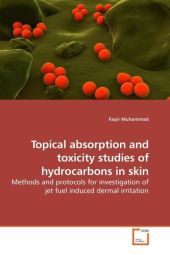 Neuerscheinungen 2010Stand: 2020-01-07 |
Schnellsuche
ISBN/Stichwort/Autor
|
Herderstraße 10
10625 Berlin
Tel.: 030 315 714 16
Fax 030 315 714 14
info@buchspektrum.de |

Faqir Muhammad
Topical absorption and toxicity studies of hydrocarbons in skin
Methods and protocols for investigation of jet fuel induced dermal irritation
2010. 176 S.
Verlag/Jahr: VDM VERLAG DR. MÜLLER 2010
ISBN: 3-639-22962-2 (3639229622)
Neue ISBN: 978-3-639-22962-2 (9783639229622)
Preis und Lieferzeit: Bitte klicken
Dermatitis is a major health concern associated with jet fuel exposures. The initial study addressed the possible mechanism for additive interactions on hydrocarbon disposition in synthetic and biological membranes. The remaining studies focused on neat hydrocarbon absorption and toxicity in pig skin. A dose related increase in percutaneous absorption of aromatic hydrocarbons was observed. This finding focuses attention to occupational settings where workers are repeatedly exposed to fuels. To assess the effects of jet fuel pre-exposure on subsequent hydrocarbon dermal absorption, pigs were exposed to JP-8 soaked cotton with 4 repeated daily applications to mimic the occupational scenario. There was a 2-3 and 3-4 fold increase in absorption of short chain aliphatic and most of the aromatic hydrocarbons through 1- and 4-day JP-8 pre-exposed skin, respectively. Stratum corneum studies with FTIR spectroscopy suggested that lipid extraction might be the primary mechanism for this increase in hydrocarbon absorption. Finally, in vivo studies with the individual fuel hydrocarbons were conducted to identify the causative agents in fuel induced skin irritation.
Dr. Faqir Muhammad is an assistant professor in the Department of Physiology & Pharmacology, University of Agriculture Faisalabad, Pakistan. He earned his Ph.D. degree in Comparative Biomedical Sciences (Pharmacology) from North Carolina State University, USA (2004). Dr Faqir has about 12 years teaching and research experience.


